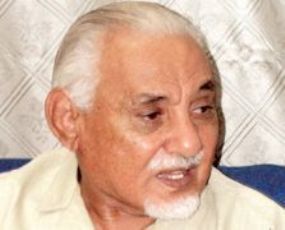DUP vice chairman slams al-Mirghani and his son for creating disunity
March 5, 2015 (KHARTOUM) – Tensions within Sudan’s Democratic Unionist Party (DUP) have come to forefront after its vice-chairman Ali Mahmoud Hassanein rebuked the party leader Mohammed Osman Mirghani and his son al-Hassan for what he said is steering the DUP against the party principles.

Hassanein is in self-imposed exile and has formed the “Broad National Front” along with other opposition figures with the goal of overthrowing the regime.
Al-Mirghani has avoided taking action against him despite his relentless criticism of DUP policies.
Hassanein said in a statement on Thursday that the DUP decision to dismiss 17 party leaders were made by someone without such authority and as a result of their commitment to the charter which rejects the regime and “farce, fraudulent elections”.
“The expulsion decisions are void in form, jurisdiction and policy and morals that aims to make the party a sub-committee of the National Congress Party and make the DUP a lost body working under NCP directives”.
He also accused the regime of “dwarfing” the DUP through temptation and intimidation.
The government-sponsored Sudanese Media Centre (SMC) website on Wednesday reported that the DUP decided to dismiss 17 of its top figures for violating the regulations of the party.
It did not say who in the DUP took this decision or why but it is well known that most decisions are made by al-Mirghani.
Hassanein slammed al-Mirghani and his son without naming them saying that the former “ascended to the leadership of the party in 1985 by virtue of holiness and patron of the Khatmiya [sect] and ran the party in a conflicting approach that contradicted with the DUP way which promotes leaders through conferences and democratic means and leadership does not come through genetic inheritance in which [their] aides come through loyalty and sycophancy and approval”.
He pointed out that this was the beginning of the rift in the party, adding that “positions are taken by the whims and interests of the president and the line between the party and the sect became blurred so now the sect is the foundation and the party is the branch.”
The DUP official added that the party identified in its constitution its strategic objectives when it committed its members to reject any totalitarian dictatorship regime whether civilian or military and to resist it.
“The head of the party and the leader of the sect was committed to this at the beginning of the Ingaz [regime] but quickly retreated and entered the regime and reconciled with it it and supported it and even became a part of it,” Hassanein said.
He made an implicit reference to al-Hassan by speaking about the one who is leading the party who has no history of getting his hands dirty in the DUP’s long history but is issuing decisions to expel leading figures.
“His only capacity claimed by him is that he is son of a sect leader so he thought the party is also of part his possessions.”
He recounted his struggles since childhood and his arrest by totalitarian regimes since November 1958 through May 1969 and through the 1989 coup.
Hassanein appealed to DUP members stressing that the religious sect should be separated from the party which is managed “without holiness” and according to the democratic principles.
The party was thrown into disarray after the cabinet affairs minister Ahmed Sa’ad Omer, who is a DUP official, announced last month that al-Mirghani is backing president Omer Hassan al-Bashir for a new term.
Afterwards, other DUP officials declared that the party will compete in the elections at all levels.
This was met by strong resistance from senior party figures who established “DUP Movement of masses and sectors” group who announced complete boycott of the elections.
The group accused al-Mirghani’s son al-Hassan of acting as party representative with the National Elections Commission (NEC) using forged documents and without authorisation in order to formalize the DUP participation in the elections.
(ST)
